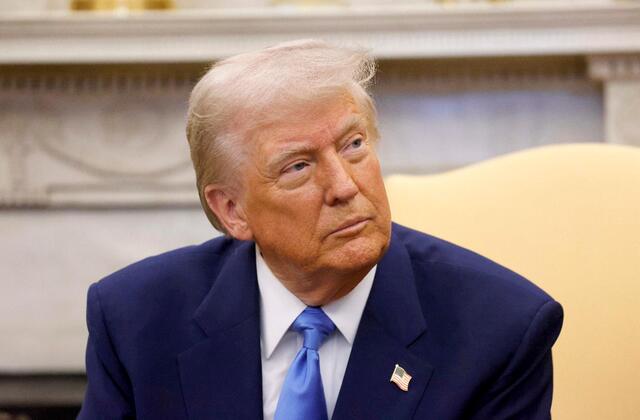President Donald Trump said tariffs scheduled for Canada and Mexico next month are on track and moving very quickly after an initial delay, even as a US official cautioned that the timetable could be less certain.
Trump was asked whether the tariffs he imposed, which he delayed until March 4, would go into effect next week when he took questions during a joint news conference with French President Emmanuel Macron. Canada and Mexico have introduced new border measures in an attempt to prevent the tariffs, which Trump has imposed in a bid to stem the flow of illegal migrants and illicit drugs such as fentanyl.
“The tariffs are going forward on time, on schedule,” Trump responded.
However, after the remarks, a US official who spoke on condition of anonymity said the fate of a special 25 per cent tariff on Canada and Mexico linked to border security requirements was still to be determined. Trump’s so-called reciprocal tariffs, which could affect all countries including Canada and Mexico, will be implemented in April, the official said.
Trump later switched gears in his response to discuss his plan to impose the tariffs. The Commerce Department is currently calculating the rate it will impose on other countries, promising to include both tariffs and other barriers to imports from the US.
“We want to have the same thing – if someone charges us, we charge them. It’s very simple,” Trump said, adding “but it will be very good for our country. Our country will become extremely liquid and wealthy again.”
Trump has moved quickly to announce wide-ranging tariffs in his second term, part of a programme to use tariffs to change what he calls the unfair tilt of the global trading system against the US and persuade businesses to create more local manufacturing jobs.
Tariffs for China
The US president has already imposed a 10% tariff on imports from China, and tariffs on steel and aluminium are due to take effect in March. Trump’s promised reciprocal tariffs could come as early as April, but for that to happen, the US must calculate those rates for each country individually. Trump has also said he is likely to impose tariffs on cars, timber, semiconductors and pharmaceutical products of around 25%, and an announcement could come as early as April 2.
Trump has praised his tariff measures as a way to spur new investment in the US and as a critical source of revenue as lawmakers work to secure legislation to extend and expand tax cuts. But economists caution that the tariffs threaten to increase inflation, a problem that helped Trump get into the White House in last year’s election, and warn that the tariffs won’t generate the revenue the president and his supporters say they will.
The tariffs against Canada and Mexico would affect US neighbours and major trading partners, threatening to shake up continental supply chains and affect key industries such as the auto sector as well as energy. Some regions of the US, including the Northwest Coast and Northeast US, are deeply dependent on electricity or gas from Canada. Trump’s tariffs would hit Canadian energy products with a 10 per cent tax.
Canada’s reaction
Canadian Foreign Minister Melanie Joly reacted to Trump’s tariff threats on border security in a call with reporters later Monday.
“I should also say that the US is a net exporter of fentanyl to Canada, a net exporter of illegal guns to Canada and a net exporter of illegal migrants coming into Canada,” Joly said.
She said trading partners facing similar tariff threats should act as a coalition, taking the same types of countermeasures, counter-tariffs.
Trump initially threatened tariffs during the transition period between being elected and taking office, accusing Canada and Mexico of not doing enough to protect the US borders, an important issue for him. Canada has begun expanding its powers to fight drug cartels in an attempt to reassure Trump that they are taking action. Canadian Prime Minister Justin Trudeau also appointed a fentanyl czar to lead efforts to stop the flow of the drug across borders.
